Cat Fostering 101
When cat adoption is not an option, there’s fostering. The need is greatest during kitten season every spring. Our guest post today, Cat Fostering 101 is from a veteran cat foster expert who lives in a small town in Maine. Vet 101 will return next week.
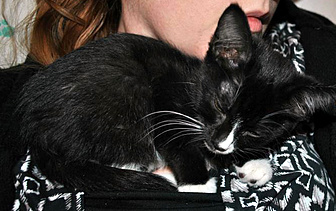
My name is Connie and I have been fostering kittens since May of 2002. Shortly thereafter I started a blog about it and called it Tails from the Foster Kittens Since then I’ve fostered over 300 cats and kittens.
When people find out I foster, the #1 question is: How do you not keep them all? This is usually in conjunction with “I could never do that; I’d never want to give them back”. Each time I hear it I laugh. But you may be surprised how it is possible and maybe you can foster too.
Fostering cats offers a break from being at a shelter
Step 1 – Find a local shelter or rescue group with a foster program. Sit down with the organization you want to foster for and see if it’s a good fit for you.
- Some organizations provide everything you and the kittens will need; all food, litter, toys, and medical treatment will be covered. Some organizations will cover medical needs but not day to day costs such as food, others do not have the resources do cover anything and you will be responsible for all care.
- It is important to know the shelter/rescue’s policies and procedures. Since the kittens will still technically be property of the shelter/rescue, you need to know exactly what they require from you in cases of illness or emergency.
- Generally they will have a handout with what you need to know including emergency contact information, because inevitably something will go wrong in the middle of the night.
- Find out what they want from you and what you can provide. Some want you have a separate room for the kittens; some want you to have your own pets up to date on vaccines.
- You will need to know what the procedures/policies are for finding the kittens homes. Most shelter/rescues handle that internally and all you need to do is return them to the facility, but some require you to transport kittens to adoption events. i.e. I wanted to foster for one rescue, but I was unable to because at the time they did not have a facility to bring the kittens back to and I could not be available to transport them to events or wait until someone contacted them looking for kittens.Once you are comfortable with what the policies and procedures on paper, then comes meeting the kitties and taking them home.
Step 2 – Bringing Foster Cat (s) Home
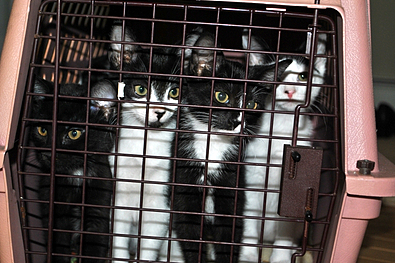
- The foster program wants this to be a very positive experience for you so they will match up kittens in need with your comfort level. New foster homes often get older kittens that are healthy and just need a few days to weeks to put on some weight. If you are willing and there is one available, a pregnant cat or one with nursing kittens are often complication free fostering situations. As you get more comfortable and experienced you might be willing to take younger orphaned kittens or even bottle babies. Kittens that are too young to be tested for disease are often the most vulnerable. Kitties that are already sick or suffering from illness or injury are the most complicated. If you ever feel you have taken on more than you can handle, they will happily provide guidance or even take the kittens back and find them a different foster situation.Bringing the kitties home, getting to know them and getting to play with them is always so much fun. I always recommend people isolate foster kittens from their resident cats for the entire time they are with you. Kitties with an unknown history could be exposed to any number of illnesses that could be very harmful to your own cats. It also helps cats, both in residence and those being fostered, that might be overly territorial and are upset that there are other cats in the house. There are people who never isolate and some that isolate for a short time and have done so for years and have not had a problem. Resident cats that are healthy and generally stress free often have a ‘harder time’ catching many of the illnesses common to stray cats, but there is still a risk if they have direct contact. To be perfectly honest there are also a few illnesses that are transferred by indirect contact as well, but that is easier to mitigate when they are isolated and you employ some basic hygiene. If you are aware of issues with your kittens, you can also insulate your cats from them by changing out your clothing after visiting the kittens. I keep a smock available for when this happens and wear it over my clothing. There is no 100% way to make sure your cats won’t catch something, but just a few extra precautions will keep the risk pretty low.
Step 3 – Foster Cat Care
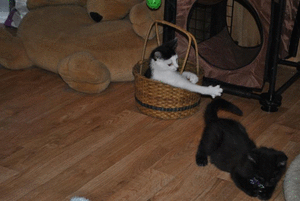
You will want to spend as much time with the kittens as you can, but there are going to be times when you just don’t have two minutes to rub together. That is OK. Remember if you are not fostering, chances are these kitties will be in a cage and getting very little attention. It is OK to just feed and do a quick cleaning if you are pressed for time. I tend to spend just a few minutes in the morning and an hour in the evenings and more time during the weekend. Kittens generally sleep sixteen to eighteen hours a day.
I once set up a kitty-cam to watch the kittens while I was at work and I found they were awake in the early morning until breakfast, they fell asleep till about late afternoon when they would have their pre-dinner play time, dinner, post-dinner play time and then they go down for the night. Cats are crepuscular so they are most active at twilight times, which make an AM and PM feeding schedule so easy to adopt. It also makes it easier for you if you have a full time job to not worry about them so much as long as they are able to eat on their own. Bottle babies, kittens who are not weaned but who do not have a mother with them do need to be tended to around the clock. Taking care of them is not difficult work, but it is a lot of work.
- Lastly I find it to be very important to introduce the kittens to as many new experiences as possible (socialization). You will have them during a crucial window of learning in which it is easier for kittens to adapt to change and accept new things.
- I have friend who fosters and she has a dog to introduce to them.
- Kids are also great to play with the kittens to get them used to it. I have neither, so I take my kittens out on trips out of the home.
- If you have a friend you could visit, that would be easiest, but you could bring them back to the facility from time to time and ask the staff to handle them.
- Bringing them in to be weighed might seem unnecessary, but it does help the kittens get used to different experiences; traveling, being in an unfamiliar environment, being handled by different people, being put in a weird situation (on the scale) and then safely returning to their safe room or nest will help them understand they don’t have to fear new things.
The Downside to Fostering
There will be times that no matter what you do or try you a kitten will die. It is heart breaking and very hard on everyone. When it happens to me, I remind myself that while the kitten’s life was way too short it was full of love and it was cared for to the end of its life and that and your tears are the gift you were able to give.
After a few days or a few weeks, time has come and the kittens are healthy, at the weight specified by the shelter/rescue to be returned. You are faced with having to return the kittens. I am the first to admit that it is hard. I failed to do it eight times (although in my defense that is only a 2% failure rate), and there have been many many more I wished I could have kept.
- There are several factors that help you “put on your big boy or girl pants” and pack them up and wish them well. When there are more than two to three kittens they become increasingly more difficult to take care of. They are venturing into areas they haven’t before, searching out new adventures. This is all well and good for them, but often we humans call it mischievous. They tend to be more destructive as well. Paper towels cannot be left unattended. Anything that can be knocked over will.
- I have been fostering for 11 years now and even I have yet to provide the kittens a room that is completely kitten proof. Each batch of kittens finds new and inventive ways to get into trouble. I often equate them to two year olds at a birthday party. They are cute and adorable, but you are oh so ready for them to go. Another foster home explained how she kept from keeping them by saying she equated what she feels for the kittens is akin to what a teacher would feel for her students. You love them all, but you realize they are not yours and they were not meant to be.
When You Bond and Can’t Let Go

There will inevitably be the time when you bond with one or a pair of kittens and you cannot stand to let them go. When that happens to me I do an assessment of my household, my finances and what it will do to my resident cats.
- Do I have enough space to house additional cats? Do I have the financial means to care for another cat and any emergencies that might come along – as well as long term elder care in the years to come? And what will the cats who already live there think? I currently have the first two but the last one is the sticking point for me. I know my current kitties would have a major re-adjustment period if I was to add another cat to my household and it would stress them out for quite some time. It would not be fair to the kitten either to move into a household would be stressed by their introduction.
- Lastly, remind yourself that there are always more kittens that need help. There will always be another batch of kittens that needs you. Getting to know a new kitten is a wonderful diversion from missing the one that just left.
Fostering is an incredibly rewarding and fun. It is also an amazing learning experience. I learned to give fluids, nurse neonatal kittens, assist in delivery, and even give a kitten an enema. Fostering is also very much in need. Many shelters are bursting at the seams during kitten season in the spring and the more that can be fostered the better.
To find a shelter or rescue group near you with a foster program or more about fostering, Petfinders makes it easy. Have you fostered any cats?

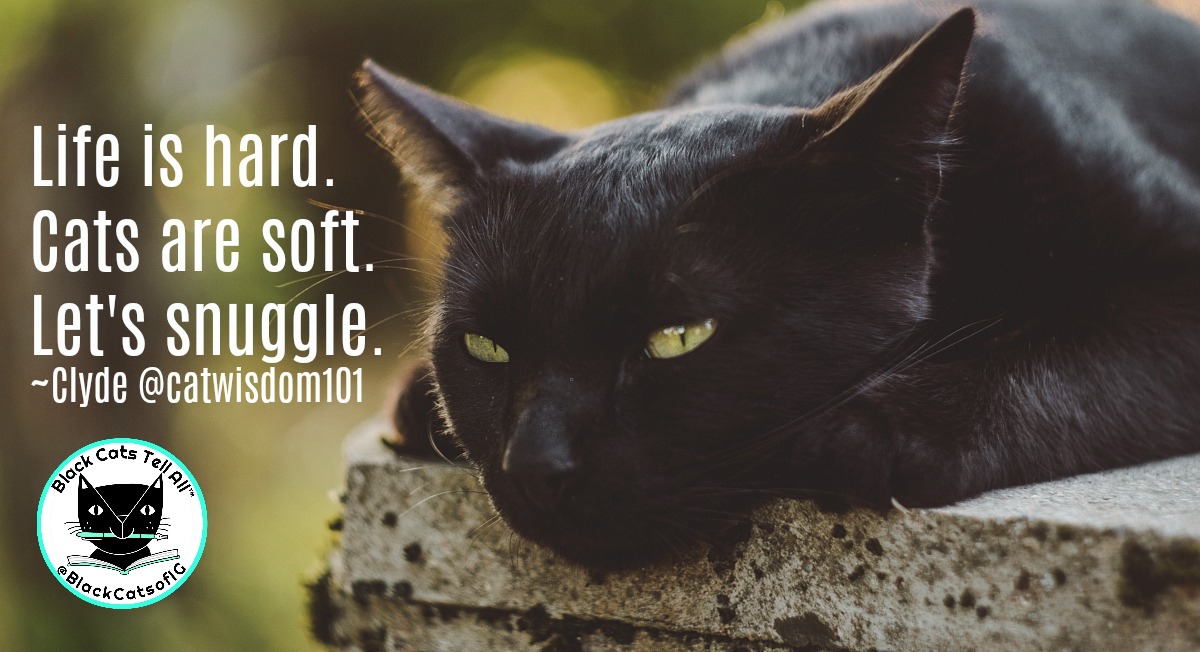
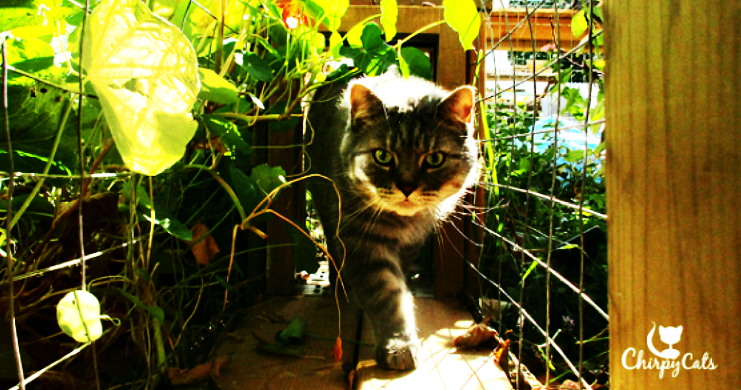
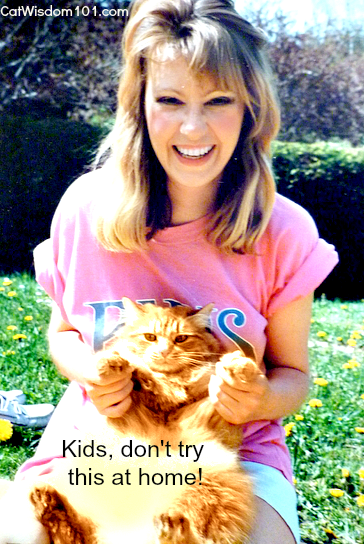
29 Comments
Zoe Campos
It really inspired me when you said that you’ve been fostering kittens since May 2002. I can imagine how much patience you have when dealing with different cat personalities, while I only adopted one and I can’t even understand her needs properly. Maybe it would be better to reach out to an animal healing communicator who can help me figure out what should I do.
ASH Green
Awesome! No words. You always go one step beyond.
There is so much great, useful information here. Thank you! Thank you! Thank you!
Ricky Flynn
nice post
CATachresis
Lovely to read Connie’s fostering experiences here, Layla. She is so experienced and her advice is excellent.
Connie
So glad everyone enjoyed the article. I was very thankful for the opportunity.
Texas, a cat in New York
Thank you for this very interesting post! We love reading Tails from the Foster Kittens, and yes, my human is the kind to wonder how you can manage not to adopt them all!
Thank you for what you are doing for those kittens! I’m sure they all keep a little part of you deep inside them =^.^=
Purrs
Kelly
I love ALL of my fosters (and even “failed” at it once). It can be bittersweet to let them go, but I choose to focus on how happy it makes their new family to bring a new kitty home instead of the sadness in parting. Besides, this way I *always* have the ability to get my “kitten fix”.
There’s only been one foster kitten that I regret letting go… and her family keeps me supplied with photos and stories. They’ve become friends (and they’re adopting another one too!)
maggie
Very inspiring post full of good ideas and information.
There’s a foster program at the shelter where I volunteer. The last few years they’ve worked harder to find foster homes for kittens who are too young to be adopted. The result is healthier, better socialized kittens. When they’re old enough to be brought back to the shelter, they’re adopted more quickly.
Deb Barnes - Zee and Zoey
What a wonderful article and resource on this subject – thank you so much for sharing the process, Connie, and for your honesty about it all! Kittens truly are an amazing creature, but boy oh boy, they really are a lot of work!! Thank you for what you do for them and for having such a kind and generous heart!
Layla Morgan Wilde
Jenny, thanks for offering another idea of venue. Fostering doesn’t have to be in a home.
Jenny Kalahar
Agreed! All adoptions went through the shelter and the people were cleared for adoption. It was all very careful, as careful as if the cats were still in the shelter itself. We let the cats stay as long as necessary to find a new home. Some were there a few days and a few were with us over a year. And some we adopted ourselves, because…we got overly attached. It happens.
Mo
Thank you for this article. The rescue organization I volunteer with always seems to pressure me to be a foster home, even though when I signed up with them, I said that right now I am unable to do so. I have fostered in the past, some successfully, and some of my cats are what some people call ‘Failed Fosters’ but who I call family. I’ve also had a kitten that I was fostering pass away, and that was very hard. One day, when I’m in a better situation to do so, I will foster again.
One thing that helped me from “keeping them all” was going into the situation knowing they’d only be with me for a short time, and that I was just a stepping stone to them getting a Forever Home.
Skeeter and Izzy
That which means the most is seldom easy……
Luvs Skeeter and Izzy >^..^<
da tabbies o trout towne
ewe noe, frank lee that bee R momz biggest fear…we iz bein honest, that if her fosters, her iz knot gonna wanna give de kittehz up….her haz fosterin on her ta due list when her ree tirez frum her place oh employ…..
Layla Morgan Wilde
Yay, this is progress, you’ll have to link up the email you used with your old gravatar. Plus the commentluv works perfectly!
Donna
I have been fostering since 2008 and have loved every minute of it. even when I was attacked by the momma cat for something stupid I did and through losing a whole litter and another bunch with ringworm. I always shed a few tears when any of my fosters leave me but I know my job is to get them to the point where they can find their forever homes and I am glad to see that I have helped them get there. I failed my first fostering but have resisted adopting any others though there were some that I would have loved to have kept but I know I can’t afford any more then 2 so I do the next best thing and foster as often as I can am needed.
mollieandalfie
I think it is absolutely marvelous what these people do Fostering. If I had the room I would do that but I would find it so hard letting go..xx00xx
Mollie and Alfie
Brian
Great post! Live long and foster!
Waffles Too Kitty
hi from Waffles Too!
Marg
I have fostered a couple of cats and guess what, they are still here. One that I really wanted to keep and one really needs another home but the rescue people won’t help me find a home for her. I would like to foster some more but finding homes for cats where I live is next to impossible. That is another thing to consider. Will there be a possiblity for a home. Great post though and fostering is so important.
Alana
Fostering is wonderful! It’s how I got Crepes, my constant companion and inspiration. I highly recommend it!
nancy
Wonderful post! I have been honored to foster and socialize six litters of kittens, as well as several adult cats over the past four years. It is all Connie says it is–and very rewarding when they find great homes. Thank you for sharing!
Debbie
I’ve been a county animal shelter volunteer for about 10 years, and have fostered off-and-on for the past 6. I’ve had several “foster failures”, but the inn is full now. The hardest part of fostering is giving them up–not so much the kittens who, while adorable, are wild and crazy guys, but the adults who seem to know you’ve gone out of your way to care for them, especially when they seem to fit in with your family and lifestyle (and other pets) so well. But when you do see them placed into a loving home and especially when you hear how much the new home adores the cat/kitten,… well, there’s no feeling quite like knowing you’ve been a part of it. No doubt about it, fostering saves lives! If you love animals, please consider giving it a try!
Layla Morgan Wilde
Thank-you for fostering!
Katie and Coccolino
Cat fostering is so wonderful. It is such important work and so hard to say goodbye when the time comes but when a cat finds a forever home it makes it all worth it. Great article.
Oink oink,
Katie and Coccolino the mini pig
Alana
Coccolino! I just had to comment on the name. What a wonderful name for a pet. Dear little snuggles. 🙂 – Alana.
Random Felines
We LOVE Connie!! Great article. And it is true – people ask our mom too about “how can you give them back”. Cause after about 6-8 weeks of crazy kitten antics, it is TIME!!! Love the “kids at a birthday party” analogy. Fostering can be hard, but it is SO rewarding….
Judi Daly
This was great to read. I plan to retire in a few years, and I had given thought to fostering, as I have a big house that I can block part off for fosters and lots of love to give them. This makes me think it would work.
Anne
I’ve been fostering for a local rescue for about 2 years now. I’ve only been a ‘Foster Failure’ once. Another time it was real close, but a very good friend adopted her so I get to see her sometimes. I cry every time someone goes on an interview and gets adopted.
But I know I can’t keep them all, and the more I would keep, the less room we will have to save more from the high kill shelters. So we look at it as, if we keep him or her, another one may die because we have no room to take it in. Makes it easier to give the kittens up. I always say, it’s a happy/sad thing. You’re happy they have a home, but sad that they are leaving.